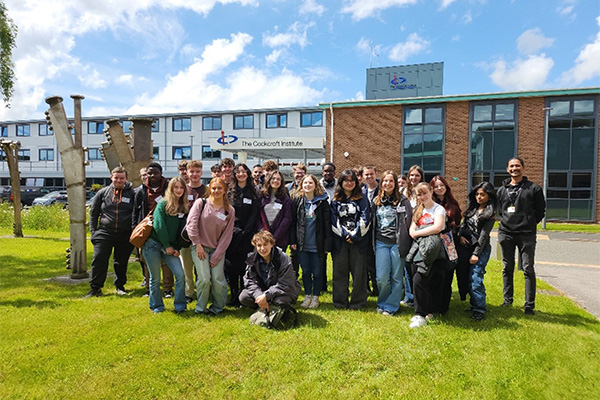Exploring cutting edge science

At the beginning of June, the University of Liverpool's Department of Physics hosted its Annual Work Experience Week for A-Level students. This event, designed for students from Widening Participation partnered schools and the local city region, welcomed 27 students.
The students engaged in introductory talks, team challenges and gained work experience in various laboratories for condensed matter, nuclear, and particle physics. On the Monday, Prof Carsten P Welsch, Head of Accelerator Science at Liverpool, gave an overview talk about the cutting-edge R&D carried out in the accelerator science cluster. He explained how the cluster's research is structured across three main pillars: frontier accelerators, novel accelerators and accelerator applications. He gave examples from current projects that are being realized in close collaboration with international partners, and ended by speaking about the group's current plans for the future.
Dr Narender Kumar, research coordinator within the QUASAR Group, organized a successful tour of the Daresbury Laboratory Campus on 14th June 2024. The tour provided A-level students an unforgettable experience of various laboratories dedicated to particle accelerators and related technologies. The students were accompanied by Dr Ellis Rintoul and Dr Ellen Sandford from the University of Liverpool’s Department of Physics.
The tour included visits to several state-of-art laboratories, such as the Diagnostics laboratories at Cockcroft Institute (CI), the Superconducting Radio Frequency Lab (SuRFLab), the Vacuum and Photocathode Development Lab (VISTA), the Compact Linear Accelerator for Research and Application (CLARA), the LINAC Test Facility (LTF) and the Deep Underground Neutrino Experiment (DUNE) at Daresbury Campus. The tour was guided by CI colleagues and STFC ASTeC Staff. The students gained insights into the complexities and unique aspects of each laboratory, highlighting the advanced scientific knowledge behind the accelerators and their technologies.
The week received excellent feedback, with 79% of survey responses saying they are more likely to study physics and at the University of Liverpool as well as praising the enthusiasm of the staff.
We would like to thank all the guides, Dr Bharat Singh Rawat for escorting the group, and the participants whose enthusiasm made the journey memorable. A special thanks to all the laboratory in-charges for their cooperation in planning and executing this tour.